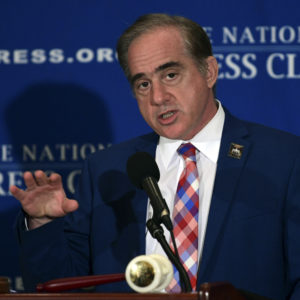On the 99th year of celebrating those who served our country in uniform, Veterans Affairs secretary David Shulkin said that access to mental healthcare for veterans is a “true American healthcare failure,” but that progress is being made and that his ‘candid relationship’ with President Donald Trump only helps.
There have been over a dozen high profile members of the Trump administration who have been fired or who have resigned this year, but Shulkin appears to be one the rather rare Trump appointees that not only was part of the Obama administration (he worked in the VA from 2015-2017) and unanimously sailed through his confirmation hearing but also apparently likes the president’s unfiltered and combative approach to politics.
“I share with him the view that the VA has a lot of problems and the VA has to take those problems seriously if it’s going to fix them. Being candid about those problems is my approach as well… I think that the President has recognized the progress that we’ve made so far but knows, and I agree with him, that we have a long way to go before we can declare the VA as a system that is truly serving, optimally, the veterans who deserve our services,” Shulkin said during a Washington Post event yesterday.
The management styles of the president and Shulkin overlap. Shulkin said that they have agreed on clear objectives for the VA and that the president has allowed him to execute those objectives as Shulkin sees fit. However it has also been made clear through their private conversations that — in classic Trumpian fashion — if Shulkin doesn’t get the job done that “there will be consequences” from the White House.
Shulkin went into detail regarding some of the primary issues facing the VA, particularly in regards to veteran suicides which remain an extremely challenging problem with 20 suicides a day. Six of the 20 suicides daily were users of the VA services when they passed away.
“So of the 14 veterans a day who take their life who are not in the VA system, our concern is that they may not be getting any care at all… clearly access to be behavioral healthcare is a true American healthcare failure. It is just too hard to get the right behavioral healthcare that you need. Part of it is the way our insurance system works and economic, and part of it is stigma, unfortunately,” Shulkin said.
He also highlighted the fact that most Americans don’t realize that the impact of war is often only seen decades and decades after veterans return home. For example World War II veterans’ peak usage of the VA services was in 1986, and Vietnam veterans are currently the largest group the VA helps above the age of 50.
Younger veterans and women in particular are making up more and more of veteran suicides these days, though.
Women veterans have become the single largest increase in the demographic of veteran suicides with risk for suicide 2.4 times higher among female veterans when compared to U.S. civilian adult females. Younger veterans from more recent wars in the Middle East are currently the fastest growing segment in regards to veteran suicides even though they don’t form the largest number.
Most veteran suicides, 66 percent, occur from firearms, so Shulkin said the VA is a very strong advocate on educating veterans regarding the safe usage of guns and says that the VA hands out thousands of gun locks a year for protection.
The secretary also wants to create and implement a buddy system for veterans so that someone who knows what veterans are going though is communicating with them and can help reduce suicides. A peer to peer effort on gun safety, mental health, and general wellbeing would lead to fewer suicides, Shulkin argued.
Getting veterans into the VA system is the primary challenge, Shulkin said. The department is working to bring about an awareness of the resources that the VA can provide to veterans struggling.
“We do know that the rates (of suicide) are lower for those that get care within the VA system and particularly women who get care within the VA system have actually been experiencing a decrease over the past 14 years in suicide while those that are out in the community (not within the VA system) are seeing dramatic increases.”
Shulkin stated in an opinion column yesterday that the VA’s life-saving Veterans Crisis Line had a call rollover rate last year that “often surpassed 30 percent. Today, that rate averages less than 1 percent.”
Another key point Shulkin pointed out in his management style of the VA was a decentralization of power and responsibility from Washington, D.C. as much as possible, although he emphasized outsourcing both “authority” and “accountability” to local VA hospitals and centers.
“I’m trying to stop VA being run out of Washington, D.C. The VA needs to be run out in the field where the care is and we need to give those who are responsible for running facilities both the authority and the accountability to get their jobs done right. So this should be less about control out of Washington.”

